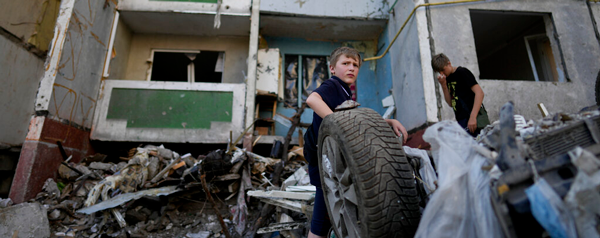Children stand in front of a building destroyed by attacks in Chernihiv, Ukraine.
AP Photo: Natacha Pisarenko
I wanted to share my latest op-ed in NBC News Think, about the critical need for ongoing support for Ukrainian children who have been displaced by war. That includes education and the psychosocial support needed to address the long-term and emotional toll of Russia’s deadly war. From my recent travels to Warsaw, Poland, and Lviv, Ukraine in April and May, I witnessed hospitals and makeshift shelters filled with internally displaced Ukrainian children languishing in unfamiliar settings. Many of the children I saw were already displaying signs of disassociation and depression – key symptoms of post-traumatic stress.
While a variety of international NGOs, the Polish and Ukrainian governments, and the people in both countries continue to provide crucial shelter and life-saving assistance to these children, I believe there is much that needs to be done to improve the mental well-being and long-term educational trajectory of displaced Ukrainians. Addressing these gaps is exactly what the Ukraine Children’s Action Project – which I co-founded along with my wife, Karen – is working to do.
To read more about the ongoing need of Ukrainians, and the work that the Ukraine Children’s Action Project aims to do in Ukraine (where I’ll be returning to again next month), you can read the full article here.
****
“As far as mental health support is concerned, every teacher, health care worker, and political leader I spoke to in Lviv expressed concern that so many of the internally displaced children who are now being sheltered in the region have suffered psychological trauma. The children had fled in fear for their lives from Russian brutality, lost loved ones and friends, and missed the dads who were off fighting.
And in a Warsaw high school, I met Ukrainian teenagers who clearly were suffering in silence, already displaying evidence of post-traumatic stress, such as difficulty sleeping, disassociation from others, and depression.
A big problem with the inevitable disruption caused by war is that children who lose ground academically or suffer from persistent, untreated psychological trauma (or both) may have significant challenges to the possibility of leading productive, successful lives in the future.”
As seen in:


